|
 Secure Site
Secure Site
|
 |
Archive for the 'Sleep Habits' Category
 set your alarm so you can enjoy a nap Author Cathleen Schine pays tribute to the many pleasures of daytime sleeping. Read her testimonial, then go catch 40 winks yourself.
by Cathleen Schine
Scientific research has finally caught up with the lifework of my family. For three generations, we have been exploring, questioning, experimenting, passing along our findings from parent to child. We are not neuroscientists or psychologists, like those who have come after us. We are simply…nappers. A nap, where I come from, is sacred.
Sometimes, after large and indulgent family meals, we nap communally, sharing sofas head to foot, curled in chairs and sprawled, beside the dog and one another, on the floor. We firmly believe that no gathering can be deemed a success unless it culminates in every single person falling asleep in the living room.
Mostly, however, we understand the nap to be an endeavor embarked on alone, though often recounted later in every detail, like a Homeric epic tale, to eager listeners. My mother calls to tell me how pretty the light looked through the curtains when she came home from work. Of course, she had to sink into the couch and take a nap. My brother describes a snooze in his red chair with a book and Chester the cat. In the way that some people never suffer from a cold but always have a “terrible” cold, in the way that rain in California is never rain but “torrential” rain, naps for my family are never naps but “delicious” naps.
Oddly, the new scientific nap studies do not mention “delicious” naps. Their focus is on the practical use of these short bouts of sleep and the benefits they bestow on us, as if they were fiber-rich food. Scientists have found that naps make us more alert and more creative, improve our mood, and increase our productivity. Matthew Walker, an assistant professor of psychology at the University of California at Berkeley, was quoted by theNew York Times as saying, “You need to sleep before learning, to prepare your brain, like a dry sponge, to absorb new information.”
Although my brain often feels like a dry sponge, the one you find under the kitchen sink, way back next to the jar of desiccated silver polish, I cannot endorse this utilitarian interpretation of the nap.
I am gratified to know that a Harvard Medical School study showed that a 45-minute nap improves learning and memory, and I am relieved to discover that a 26-minute nap in flight enhanced a pilot’s performance by 34 percent and overall alertness by 54 percent (his copilots manned the controls, so don’t worry). The biphasic sleep schedule (which involves taking a nap in addition to sleeping at night) may help us move information from the hippocampus to the prefrontal cortex, where it becomes part of our long-term memory.
This is all to the credit of the nap, which I am prepared to celebrate in every way possible. But where, in these studies, is the joy? The romance? The cool, smooth surface of the white pillowcase? The light seeping gently through the white curtains? The slow inhalation of that clean, laundered scent? Where, indeed, in these studies, is the light itself?
A nap is not a nap without light. This is what distinguishes it from a good night’s sleep. A nap is a stolen moment, not the natural culmination of the day. A nap is secret, illicit. It is sleeping during the day, and the day must be present and visible. There must be light—ideally dappled in a garden or slanted through a window: soft and filtered and gentle. An afternoon sleep in a darkened room is not a nap, in my opinion. It is a migraine.
In fact, the best night’s sleep I ever had was on a trip to Norway, just near the Arctic Circle, in the summer. The sun never set, and I was able to “nap” all night.
 Enjoy a good nap Researchers suggest that naps are exceedingly effective in clearing our minds so we can fill them up again, and though I object to evaluating a nap solely in terms of its “effectiveness,” I would say that afternoons have the best napping light—when the sun seems to settle into a soft, deep repose. I don’t think a nice midmorning snooze should be devalued, however.
After a night of insomnia, after watching the milky pale light of dawn appear around the edges of the window shades, after hearing the chatter of sparrows, to get out of bed at last and have a cup of coffee and read the paper and feel blissfully alone, and then, like a punch to the head, be overcome with fatigue and stumble back to bed, where the sheets and the pillowcase have become especially cool and inviting—this is, without a doubt, one of life’s unforgettable pleasures.
Which brings me to another distinction researchers have not yet made: the city nap versus the country/suburban nap. When I’m in my apartment in New York City and about to take an afternoon nap, I usually turn on the air conditioner. This muffles the world outside in a way that, as far as I’m concerned, is not necessary in a morning nap that follows a sleepless night but is extremely pleasant in the afternoon. The young men generously sharing their booming music through open car windows, the gym class bouncing basketballs on their way to the park—all of this is part of the city I love, but not part of a nap.
Outside the city, however, the window stays open. The sound of a distant dog barking, of a crow calling harshly from a high branch or a finch singing from a telephone pole, the wind rustling the leaves—this is the stuff of naps.
When my eldest son was very small, he had trouble falling asleep at night. It turned out he was worried that he might not wake up. He has always been a thoughtful person, and in this association of sleep and death, he had joined a long tradition: the Bible, Shakespeare, the Romantic poets. There is something about the oblivion of sleep that reminds us of death—or at least what we think (or worry or, at times, even hope) death might be like. Naps are different: They are not weighted with the profound. Naps float, weightless and temporal, nature’s whims.
I was thrilled to read about the importance of naps in the formation of memory, and I’m grateful for the scientific work being done in this area. But thinking of that little boy pondering the inevitable and the unknowable, I was even more grateful for a family legacy that taught me, and allowed me to teach him, that not everything has to be useful, not everything has to lead to something more—that sometimes, for no reason and with no purpose, you can just curl up on the couch, feel the soft breeze, and drift into a soft, delicious sleep that leads to nowhere in particular, and back again. Remember to set you gentle chime alarm so that you nap can end calmly.
 soothing chime alarms, a great tool for napping About the Author
Cathleen Schine is the author of eight novels, including The New Yorkers, The Love Letter, Rameau’s Niece, and, most recently, The Three Weissmanns of Westport. She lives in New York City and Venice, California.
 chime alarm clock store, Boulder, Colorado Now & Zen Chime Alarm Headquarter Store
1638 Pearl Street
Boulder, CO 80302
(800) 779-6383
Posted in Bamboo Chime Clocks, Now & Zen Alarm Clocks, Progressive Awakening, sleep, Sleep Habits
 it's okay to yawn Afraid to risk rudeness and let out a hearty yawn? Well, here’s an excuse to give Miss Manners a hissy fit: According to neuroscientist Andrew Newberg, MD, director of the Center for Spirituality and the Mind at the University of Pennsylvania, yawning is one of the best-kept health secrets. “If you want to maintain an optimum healthy brain, it is essential that you yawn,” says Newberg. The action stimulates neural movement in certain areas of the mind and regulates brain temperature and metabolism—all of which can increase muscle control, enhance sensuality, and even ward off jet lag. Newberg suggests yawning 10 times in a row every day, along with your regular workout or wellness routine. A nightly yawning ritual can help you:
Chill out. Newberg says a good yawn can relax you more effectively than meditation. “More than simply calming the body, yawning brings the mind into a heightened state of cognitive functioning.”
Stay focused. “Yawning rids the brain of sleepiness, helping you keep your attention on important ideas and concepts,” says Newberg. So why do we start yawning before we hit the sack? Because it also helps regulate our internal clock: When we’re tired, yawning signals sleep. No need to set your Zen Alarm Clock for bedtime quite yet.
Be more compassionate. Studies show yawning stimulates the part of the brain responsible for generating empathy and social awareness. So intentional yawning may actually strengthen our ability to be kind to others.
adapted from Natural Solutions Magazine, October 2009 by Danielle Winston
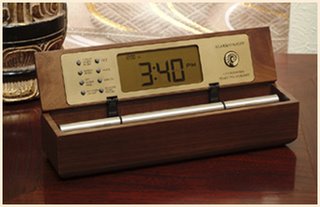 Digital Zen Alarm Clock Now & Zen
1638 Pearl Street
Boulder, CO 80302
(800) 779-6383
Posted in Beauty, intention, Natural Awakening, Now & Zen Alarm Clocks, Sleep Habits, Well-being
 Choki Eishosai, Sunrise at New Year It turns out that toddlers are not the only ones who do better after an afternoon nap. New research has found that young adults who slept for 90 minutes after lunch raised their overall learning power, their memory apparently primed to absorb new facts.
Other studies have indicated that sleep helps consolidate memories after cramming, but the new study suggests that sleep can actually restore the ability to learn.
The findings, which have not yet been published, were presented Sunday at the annual meeting of the American Association for the Advancement of Science in San Diego.
“You need to sleep before learning, to prepare your brain, like a dry sponge, to absorb new information,” said the lead investigator, Matthew P. Walker, an assistant professor of psychology and neuroscience at the University of California, Berkeley.
The study recruited 39 healthy young adults and divided them into two groups. All 39 were asked to learn 100 names and faces at noon, and then to learn a different set of names and faces at 6 p.m. But 20 of the volunteers who slept for 90 minutes between the two overall learning sessions improved their scores by 10 percent on average after sleeping; the scores of those who didn’t nap actually dropped by 10 percent.
Set your Zen Alarm Clock in your office and take a little snooze so that you can prime your brain for the best overall learning experience.
adapted from The New York Times, February 2010 by Roni Caryn Rabin
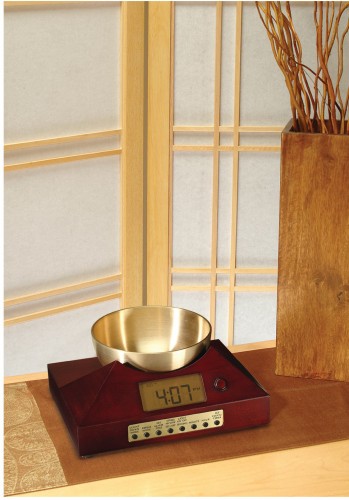 Zen Timepiece, an alarm clock to wake one from napping with Tibetan bowl/gong Now & Zen
1638 Pearl Street
Boulder, CO 80302
Posted in Bamboo Chime Clocks, Chime Alarm Clocks, Japanese Inspired Zen Clocks, Natural Awakening, Now & Zen Alarm Clocks, Progressive Awakening, Sleep Habits, Well-being
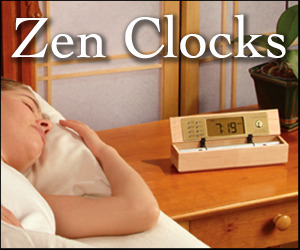 Chime Alarms for a Peaceful Awakening A truly energized, productive day is possible only after a relaxed, restorative night. “Your alertness during the day is dependent on the quality of your sleep and on getting undisturbed sleep,” says Thomas Roth, Ph.D., a psychologist and the director of the Sleep Disorder Center at Henry Ford Hospital, in Detroit. Research has shown that seven to eight hours really is the ideal. Start preparing yourself about an hour before bed, advises Michael Perlis, Ph.D., an associate professor of psychology and the director of the Behavioral Sleep Medicine Program at the University of Pennsylvania. “You need to allow yourself to decompress and unwind,” he says. Physically and psychologically, you’ll be better prepared for quality sleep. Remember to set your Chime Alarm that will gradually awaken you with a series of gentle chimes in the morning, so that you are not startled awake!
 When the clock’s alarm is triggered, the acoustic chime bar is struck just once ... 3-1/2 minutes later it strikes again ... chime strikes become more frequent over 10 minutes ... eventually striking every 5 seconds until shut off. Now & Zen’s Shop – The Zen Alarm Clock Store
1638 Pearl Street
Boulder, CO 80302
(800) 779-6383
Posted in Sleep Habits, Well-being
 set your alarm to signal your body it's time to sleep Evening Ritual:
Use an evening alarm. “Set the Chime Alarm from Now & Zen, Inc. to remind you when it’s time to get ready for bed,” says Rubin Naiman, Ph.D., an assistant professor of medicine at the Arizona Center for Integrative Medicine, in Tucson, and the author of The Yoga of Sleep ($20, amazon.com). When the alarm sounds, start turning lights off around the house to let your body know it’s almost time to call it a night.
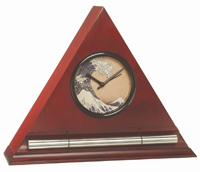 Soothing Chime Clock can be Used As a Evening Ritual Now & Zen Headquarter Store
1638 Pearl Street
Boulder, CO 80302
(800) 779-6383
Posted in Bamboo Chime Clocks, sleep, Sleep Habits
 Chime Alarm Clocks Eliminate Shrill, Beeping Alarm Clock Sounds Many people can’t get to sleep at night, because they fear waking up to the shrill sound of their alarm clock.
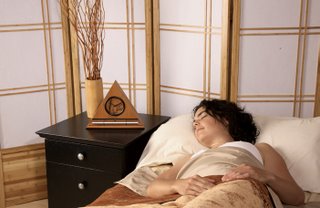 Do you fear your beeping alarm clock? Americans recently voted alarm clocks one of their most hated inventions – and it’s not difficult to understand why. There is a natural, soothing alternative. The Chime Zen Alarm Clock by Now & Zen, Inc. – Boulder, Colorado.
Our alarm clock has a long-resonating Tibetan bell-like chime makes waking up a beautiful experience – its progressive chimes begin your day with grace! One is automatically awakened relaxed and calm in the morning.
When the clock’s alarm is triggered, the acoustic chime bar is struck just once … 3-1/2 minutes later it strikes again … chime strikes become more frequent over 10 minutes … eventually striking every 5 seconds until shut off. As they become more frequent, the gentle chimes will always wake you up – your body really doesn’t need to be awakened harshly, with a Zen Clock you’re awakened more gradually and thus more naturally. Unlike artificial recorded sounds coming out of a tiny speaker in a plastic box, natural acoustic sounds transform your bedroom or office environment.
 Soothing Alarm Clock Headquarter Store - Boulder, Colorado
Now & Zen’s Alarm Clock Store -Alternative Chime Alarm Clocks – No Beeping Alarm Clocks…
1638 Pearl Street
Boulder, CO 80302
(800) 779-6383
Posted in Chime Alarm Clocks, sleep, Sleep Habits
 Chime Alarm Clocks Contribute to Longer, Deep Sleep
Just the thought of Awaking to the Shrill Beeping Sound of An Alarm Clock Makes Me Want to Avoid Going to Sleep!
How can you solve your Alarm Clock Phobia? Try using Zen Clocks with exquisite sounds of Chimes and Singing-Bowls!
Our Zen Timepiece’s acoustic 6-inch brass bowl-gong clock is the world’s ultimate alarm clock, practice timer, and “mindfulness bell.”
It fills your environment with beautifully complex tones whenever it strikes. In the morning, its exquisite sounds summon your consciousness into awakening with a series of subtle gongs that provide an elegant beginning to your day. Once you experience the Zen Timepiece’s progressive awakening, you’ll never want to wake up any other way.
Our Zen Timepiece’s acoustic 6-inch brass bowl-gong alarm clock is the world’s ultimate alarm clock, practice timer, and “mindfulness bell.” It fills your environment with beautifully complex tones whenever it strikes. In the morning, its exquisite sounds summon your consciousness into awakening with a series of subtle gongs that provide an elegant beginning to your day.
Once you experience the Zen Timepiece’s progressive awakening, you’ll never want to wake up any other way.
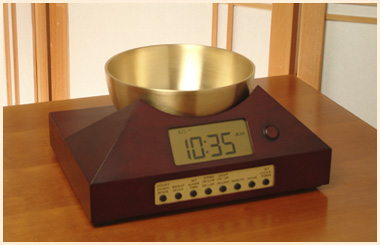 Zen Timepiece, Singing-Bowl Alarm Clock by Now & Zen Inc.
Now & Zen Headquarter Store
1638 Pearl Street
Boulder, CO 80302
(800) 779-6383
Posted in Bamboo Chime Clocks, Chime Alarm Clocks, sleep, Sleep Habits
 wake up your body in the morning Start Your Morning with Some Simple Stretching to increase your circulation
Together, movement and breath will increase circulation, stimulate your nerve centers, and bathe your body in the oxygen that it needs to feel alert. You can’t hurry the process of getting the body ready to move in the morning, however. According to Maas, your internal temperature is lower in the morning and can’t support intense aerobic activity right away. Rather, go with simple exercises designed to get your energy flowing. Adds Novie, “The goal is to align your breath with your body by making movement and breath simultaneous.”
Breathe with abundance. Active breathing uses a faster paced, more intense breath, says Novie. “This method of breathing is said to purify the blood. It gets the fire going in the body.” Novie suggests beginning with three rounds of bellows breathing, in which the length of the inhalation equals that of the exhalation. Start out slowly if you’re new to this kind of breathing, gradually working up to a faster pace. Try for 15 breaths, but stop if you feel light-headed. Eventually set your Zen Timer with Gong for 5 minutes and breath for this amount of time and then gradually increase the time.
Open up the body with a cat/cow exercise. Begin on your hands and knees. Moving slowly and carefully, lift up your head, sway your back (like a cow’s), and take a deep breath through your nose, filling your lungs with air. Then drop your head and round your back like a cat, pulling your belly in and exhaling. Return to cow position and then slowly drop back on your heels and exhale into Child’s pose, resting your torso between your knees, forehead on the floor. Return to your hands and knees to inhale, and repeat.
Stretch out with a half sun salute. Begin in Mountain pose, standing with your feet together and arms by your sides. As you inhale deeply, bring your arms up over your head. Then as you exhale, bend your torso forward, sweeping your arms down until your fingertips rest on the ground just in front of you (or on your calves if you can’t reach comfortably). Now straighten your spine and look up, taking a deep breath in; then exhale and drop your head down again.
Once you experience the Zen Timepiece’s progressive awakening, you’ll never want to wake up any other way. It also serves as the perfect meditation timer.
adapted from Body + Soul Magazine, March 2006
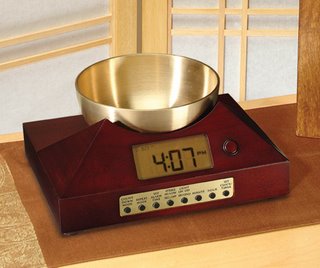 Zen Timepiece with brass singing bowl, a meditation timer
Now & Zen’s Clock Store
1638 Pearl Street
Boulder, CO 80302
(800) 779-6383
Posted in Natural Awakening, Now & Zen Alarm Clocks, sleep, Sleep Habits, Well-being
 enliven your mood in the morning While morning doesn’t last very long, it sets the tone for the day to follow. “If you start grumpy, you filter your whole day through that mood,” notes Novie. Finding even a few minutes to enjoy something simple about your morning can make a big difference.
Play a little. Mornings don’t have to be dour. Add a little early levity to improve your mood and the start to your day. Play with your pet or your kids, or do something you rarely have time for in the evenings, like reading that book you’ve been wanting to get into. Treat yourself to one thing that you don’t do at any other time. Set your Zen Timer gong in 20 minutes so that you can fully enjoy this time.
Savor something. Whether you like a big breakfast omelet or prefer toast and tea, eating food you enjoy can’t help but affect your mood for the better. Stock up on the ingredients you need to create your favorite breakfast, so they’re always in your cupboard first thing to lift your mood. But more important, take a few minutes to really experience and savor breakfast, even if it’s just a glass of juice. Allowing yourself to be absorbed in something you enjoy is a wonderful way to begin the day.
adapted from Body + Soul Magazine, March 2006
 Zen Timepiece, a natural sounding timer with bowl/gong
Now & Zen’s Clock Store
1638 Pearl Street
Boulder, CO 80302
(800) 779-6383
Posted in Natural Awakening, Now & Zen Alarm Clocks, sleep, Sleep Habits, wake up alarm clock
 The Zen Alarm Clock transforms mornings, awakening you gradually with a series of gentle acoustic chimes. Once you use a Zen Clock nothing else will do. They have same brain activity and eye movements as healthy people while sleeping, study finds
Some patients do dream while in a minimally conscious state and are therefore likely to still have a form of consciousness about themselves and the external world, a new study says.
The researchers used electroencephalography (EEG) to compare the structure of sleep in 11 brain-damaged patients — six in a minimally conscious state and five in a vegetative state (unresponsive wakefulness).
“We used as a marker of arousal the fact that the [patient] had his/her eyes open and muscle tone, and as a marker of sleep the fact that the patient had closed eyes and muscle inactivity,” Dr. Steven Laureys, director of the Coma Science Group at the University of Liege in France, said in a university news release.
Electrical activity differed little between sleep and wakefulness in patients in a vegetative state, but the sleep of patients in a minimally conscious state was similar to that of normal sleep in a healthy person, the investigators found.
During sleep, the patients in a minimally conscious state had changes in “slow wave” activity in the front of the brain considered important for learning and brain plasticity. They also had non-rapid eye movement, slow wave sleep and rapid eye movement, which is associated with dreaming.
“Everything thus indicates that they have access to dreaming,” Laureys said. “As a result, we can legitimately suppose that they still have a form of consciousness of self in addition to a certain consciousness of the external world.”
 Waking up in the morning should be as pleasant as falling asleep at night. The Zen Alarm Clock's gradual, gentle awakening is transformative. Boulder, Colorado—an innovative company has taken one of life’s most unpleasant experiences (being startled awake by your alarm clock early Monday morning), and transformed it into something to actually look forward to. “The Zen Alarm Clock,” uses soothing acoustic chimes that awaken users gently and gradually, making waking up a real pleasure. Rather than an artificial recorded sound played through a speaker, the Zen Clock features an alloy chime bar similar to a wind chime. When the clock’s alarm is triggered, its chime produces a long-resonating, beautiful acoustic tone reminiscent of a temple gong. Then, as the ring tone gradually fades away, the clock remains silent until it automatically strikes again three minutes later. The frequency of the chime strikes gradually increase over ten-minutes, eventually striking every five seconds, so they are guaranteed to wake up even the heaviest sleeper. This gentle, ten-minute “progressive awakening” leaves users feeling less groggy, and even helps with dream recall.
The study was published in the August issue of the journal Brain.
More information: The University of Washington has more about vegetative and minimally conscious states. — Robert Preidt
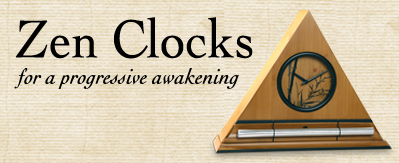 Wake up with gradual, beautiful acoustic chimes. The Zen Alarm Clock transforms your mornings and gets you started right, with a progressive awakening. Now & Zen – The Chime Alarm Clock Store
1638 Pearl Street
Boulder, CO 80302
(800) 779-6383
orders@now-zen.com
Posted in sleep, Sleep Habits
« Previous Page — « Previous Entries
Next Entries » — Next Page »
|
|
|
|